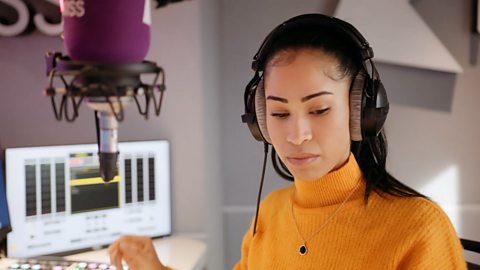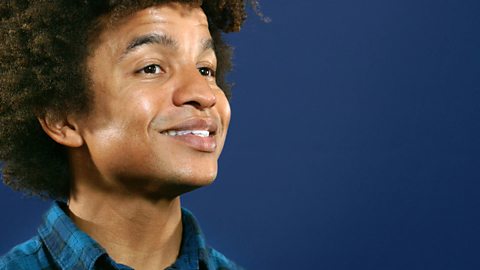Meet Nick and find out about his life as a radio and podcast presenter. Part of our Bitesize world of work series.
Nick Bright - Radio presenter
You need to be somebody who can connect with people; you need to be somebody who can talk a lot, which I definitely tick that box! At the end of the day people are listening to you on the radio because they want some kind of company. I love the fact that I can change somebody's mood, whether it's by saying a goofy joke or playing a song that they like. What we're here for as radio presenters is to educate and entertain, one, but two, without the audience we're nothing so I try and remember that all the time.
Whilst I was at college, that's when I fell in love with radio because I got involved with community radio. I wasn't actually set on going to university, but then I did go to university, did radio production and then from there I was just applying for jobs at the BBC and I eventually managed to get some interviews here and then, you know, cut a long story short, I've never left!
It's strange because some people really benefit from having a routine and we do have a routine, kind of, but one of things I enjoy is I can come in with all the intentions to talk about a particular thing and then it completely changes and we end up talking about something else.
There's so many challenges in media and one of the main ones is that you'll hear 'no' so many more times than you'll hear 'yes', that's just not in my job, that's… that's in life, to be honest with you, but in media, you have to a particularly thick skin, if you're studying, whatever field it is, try and get in and do something because people like it when you're doing something and, when I say people, I mean potential employers. If you just kind of sit around and hope for experience to find out, you'll be sitting around forever. If there's a student radio station, community radio station, a hospital radio, whatever it is, just go in and get your hands dirty because it's all experience at the end of the day.
I know there's loads of you out there, potentially watching this that are like, you know 'what do I need this for, Sir? What do I need this for, Miss? This isn't going to help me in life!' but actually indirectly, so many of those subjects you study at school will end up helping you every single day in your working life. Maths, helps you every single day in radio because we have to go to the news at a certain time and you have to hit it bang on so you have to use maths to back time and do that. English, as well, really really important because obviously you speak for living so if you're no good at English then you're in trouble if you're on the radio!
So for me, obviously, I'm really loving being on 1Xtra and Radio 5 Live as well but I'd love to do a bit more, maybe get out to the Olympics and do some work at the Olympics for BBC Sport, just to get more. As humans, we're always looking for the next thing and that doesn't mean I'm unhappy with what I've got now but it just means I want to improve and try and capitalise on this opportunity that I've got.
I love the fact that I can change somebody's mood - whether it's by saying a goofy joke or playing a song they like.
Nick Bright is a radio presenter for BBC Radio 1Xtra and Radio 5 live, incidentally combining his two passions, music and football
Whilst at college, Nick decided he wanted to do something in Radio. After some deliberation, he decided to go to university and did a course in radio production. In his last year at university, he applied for jobs at the BBC and was successful. Since then, he has held various posts at the BBC, gaining experience and continually challenging himself
"There are so many challenges in media… You hear 'no' a lot." Nick confides. His top tip is to "try and grow a thick skin", you'll have knock-backs but just keep going
Getting into a career as a presenter is highly competitive. Nick's advice is to get as much industry experience as possible. Volunteering at your local community, university or hospital radio station is a good way to build examples of work that you can show potential employers.

A similar job to a radio presenter is a DJ (disc jockey). DJs play music for audiences in live venues, at events or on the radio.
What to expect if you want to be DJ
- DJ average salary: Variable. You may be self-employed/freelance
- DJ typical working hours: 45 to 47 hours per week.
What qualifications do you need to be a DJ?
You could get into this role via a college course (such as a Level 2 certificate, a Level 3 Diploma or a T-level in Media, Broadcast and Production - England-only, from Sept 2023). You can also volunteer at community or hospital radio stations, or DJ at events like parties, weddings and charity shows. Alternative routes also include taking training courses or attending DJ workshops. You can also apply directly if you have relevant experience.
Sources: LMI for All, National Careers Service, GOV.UK
This information is a guide and is constantly changing. Please check the National Careers Service website for the latest information and all the qualifications needed and the GOV.UK website for more on T-levels.
For careers advice in all parts of the UK visit: National Careers Service (England), nidirect (Northern Ireland), My World of Work (Scotland) and Careers Wales (Wales).

Work experience in your area
Find work experience placements with Workfinder.
Tips and advice
Help with interviews, writing a CV and all things work experience related.

Swarzy: radio presenter. video
Swarzy's a radio presenter for Kiss FM.

Careers A to Z: Find your perfect job
From actor to zoologist, find the right fit for you.

Radzi: TV presenter. video
Ex-Blue Peter presenter, Radzi, on a career where no two days are the same.
